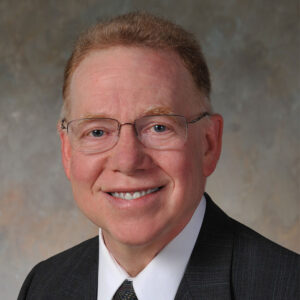
Dr. Chatwell
The rheumatologists interviewed had mixed reviews on whether telemedicine has continued to work well for them beyond the pandemic.
Dr. Chatwell says his practice isn’t using telemedicine currently because of the inability to physically examine the patient, the complexity of multisystem diseases and the need for lab monitoring for certain medications.
Dr. Magnano uses one of her four clinic days each week for a virtual clinic, done from her home office. These appointments enable her to deliver test results, establish a diagnosis after an in-person consultation and provide routine follow-up care for stable patients.
Dr. Daugherty’s office uses telemedicine because some patients have to travel long distances to get to the office. “We emphasize the need for in-office visits as well so we can ensure optimal safe and effective care,” he adds.
Another major patient care issue is deciding who will handle prior authorizations. At the Arthritis Center of Nebraska, staff, most of whom are registered nurses, handle this task. The practice tried third-party vendors in the past, but they had so many questions that it wasn’t a time-saving option, Dr. Chatwell explains. “Insurance companies and pharmacy benefit managers continue to hamper or delay our ability to care for patients,” he says.
Prior authorization is also done in house at Pacific Rheumatology, managed by three well-trained medical assistants, Dr. Magnano says.
At times, community practice rheumatologists must refer patients to academic centers. Geography can play a big role in this option, with Dr. Daugherty mentioning his close location to medical resources in Boston.
Dr. Chatwell says that getting patients into academic medical centers may take months, even when they pass the screening process. “When we have a personal physician-to-physician connection, a curbside opinion may be timely, but their availability for new patients is still limited,” he says.

Dr. Daugherty
To handle patient education, community practice rheumatologists use the range of resources available to them, and it’s often all hands on deck in terms of staffing to help with education. An initial patient consultation will include education regarding the disease process and medications involved. Before infusion of a new medication at Arthritis Center of Nebraska, an advanced practice provider will meet with a patient to discuss the rationale, infusion process and potential risks and benefits, Dr. Chatwell says.
At Pacific Rheumatology, medical assistants provide injection training.

